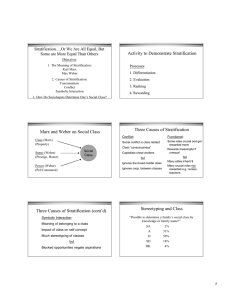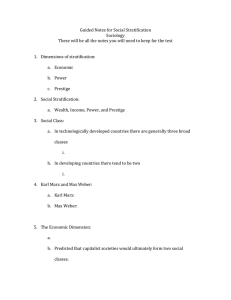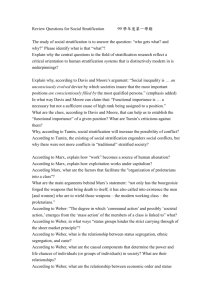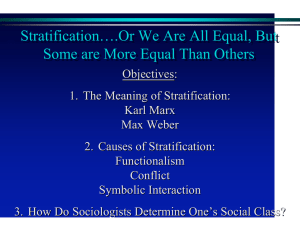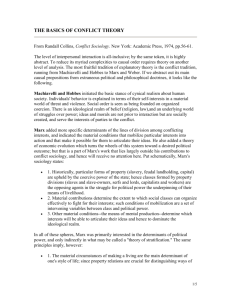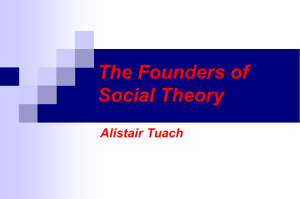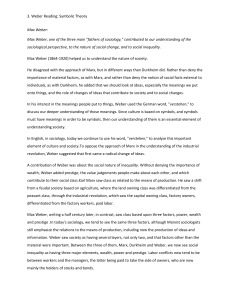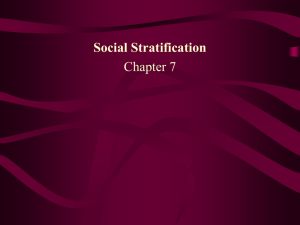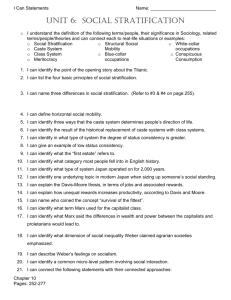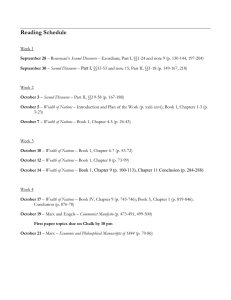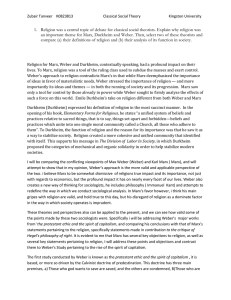Theories of Stratification & Class – Weber
advertisement
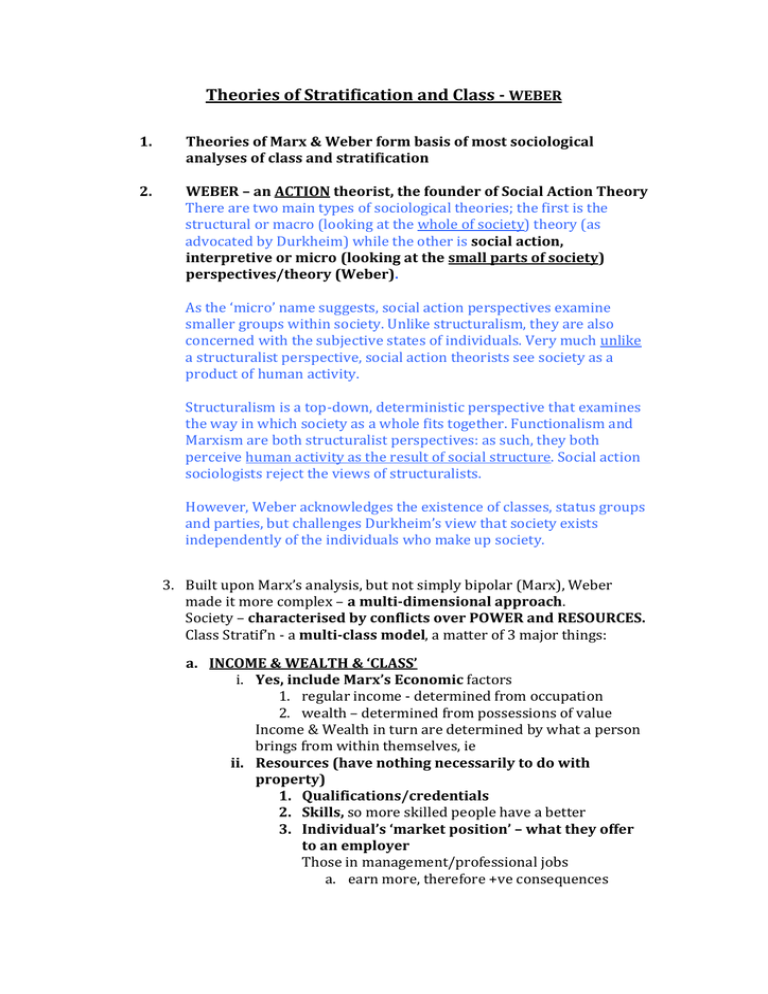
Theories of Stratification and Class - WEBER 1. Theories of Marx & Weber form basis of most sociological analyses of class and stratification 2. WEBER – an ACTION theorist, the founder of Social Action Theory There are two main types of sociological theories; the first is the structural or macro (looking at the whole of society) theory (as advocated by Durkheim) while the other is social action, interpretive or micro (looking at the small parts of society) perspectives/theory (Weber). As the ‘micro’ name suggests, social action perspectives examine smaller groups within society. Unlike structuralism, they are also concerned with the subjective states of individuals. Very much unlike a structuralist perspective, social action theorists see society as a product of human activity. Structuralism is a top-down, deterministic perspective that examines the way in which society as a whole fits together. Functionalism and Marxism are both structuralist perspectives: as such, they both perceive human activity as the result of social structure. Social action sociologists reject the views of structuralists. However, Weber acknowledges the existence of classes, status groups and parties, but challenges Durkheim’s view that society exists independently of the individuals who make up society. 3. Built upon Marx’s analysis, but not simply bipolar (Marx), Weber made it more complex – a multi-dimensional approach. Society – characterised by conflicts over POWER and RESOURCES. Class Stratif’n - a multi-class model, a matter of 3 major things: a. INCOME & WEALTH & ‘CLASS’ i. Yes, include Marx’s Economic factors 1. regular income - determined from occupation 2. wealth – determined from possessions of value Income & Wealth in turn are determined by what a person brings from within themselves, ie ii. Resources (have nothing necessarily to do with property) 1. Qualifications/credentials 2. Skills, so more skilled people have a better 3. Individual’s ‘market position’ – what they offer to an employer Those in management/professional jobs a. earn more, therefore +ve consequences b. more favourable working conditions, therefore +ve consequences c. skills, qualifications = them ‘more marketable’ Those at lower level – skilled craftsmen able to secure higher wages than semi-skilled b. STATUS/PRESTIGE Means differences betw social groups in the honour/prestige accorded by others Status in traditional societies – 1st hand knowledge, nurtured over years – this changed over time as socs became more complex Later socs, status expressed through people’s I. STYLES OF LIFE – as seen by others a. HOUSING b. DRESS CODES c. MANNER OF SPEECH (My Fair Lady http://www.youtube.com/watch?v=jhninL_G3Fg people who share the above, begin to form, unintentionally and perhaps intentionally, a community, shared identity 2. Status often varies INDEPENDENTLY OF CLASS DIVISION (very different to Mx’s view who only saw capitalists and workers) a. exceptions to general rule (money confers high status) ‘genteel poverty’, ‘impoverished aristocracy’ etc, means those with a title or honour are still accorded high status (BY OTHERS) even alth they may have lost ‘all’ their money b. ‘new money’, looked down with scorn from those with ‘old money’ c. PARTY/POWER/COMMAND can influence stratif’n separately from class and status Power – Can the person influence important decisions in society that affect other people? a. = is a group/gp of individs who work together because of common background, aims, interests, often works towards a goal in the party’s interest (includes church groups, ecology groups, sports clubs, groups in local areas, etc) b. Mx had said party organisations (and status differences) in terms of class c. Weber says, no, neither can be reduced to class divisions d. Status and Party elements can be effected by class divisions, but also both can influence the economic circumstances of individuals and groups, thereby effecting class e. Can appeal to concerns cutting across class differences, 3. i. Religious gps – see differences betw Mx and Weber’s explanations of Protestant v Catholic divides in N. Ireland ii. Political & social gps Weber gives us more to think about (than Mx) as, a. he offers a more complex interpretation than Marx of why stratification exists greater number/variety of economic factors in class stratif’n b. Consequently, Weber provides a more flexible basis for empirical analyses of stratification Weberian perspectives allowed class/income & wealth, status/prestige and party/power/command to be viewed as independent of one another. For example, wealth could be used to gain power and prestige. Another example would be that one might have high wealth/ income but low prestige/ status and little power to influence important decision in society. Social class was therefore the result of a combination of all three aspects.
